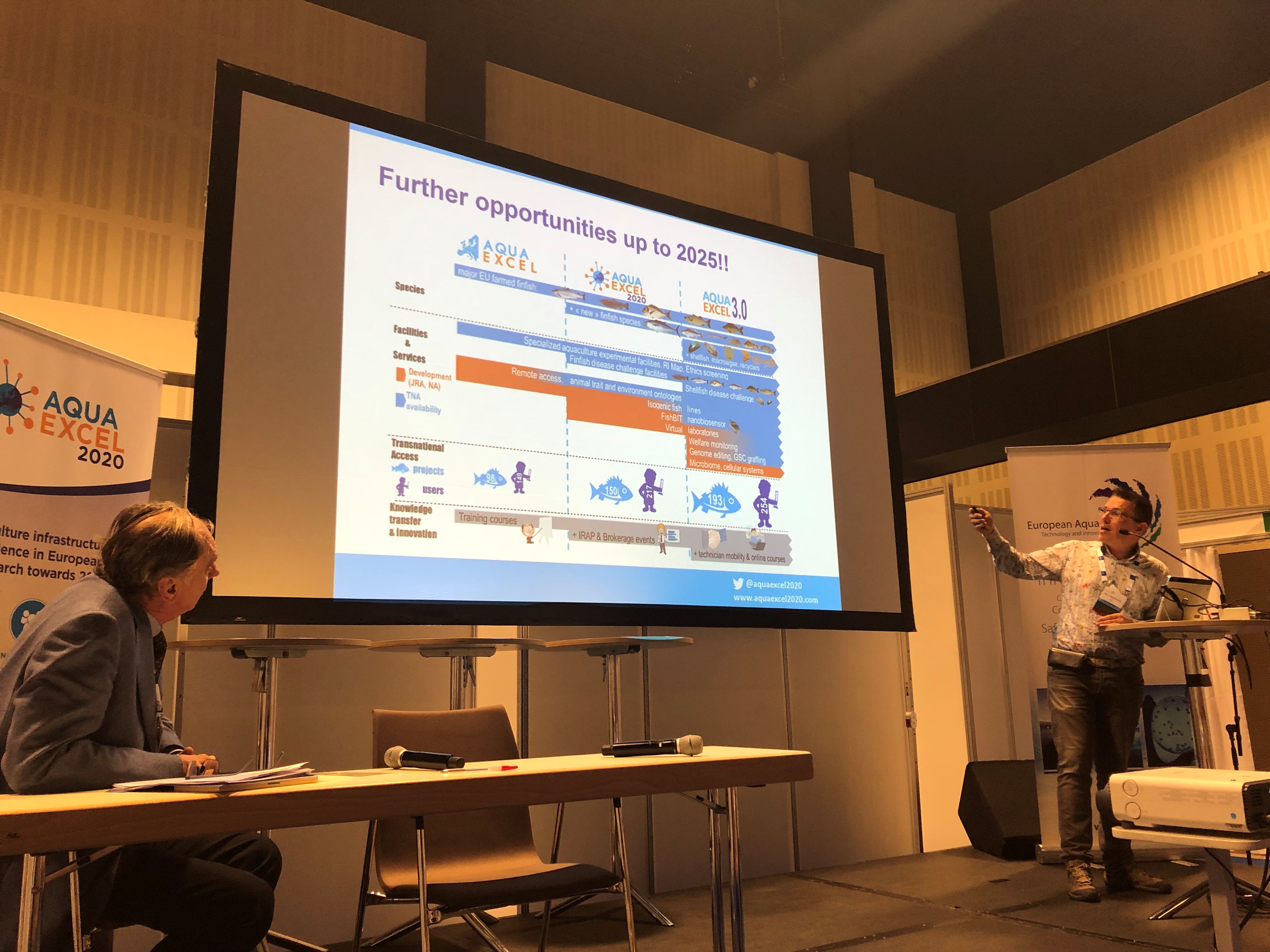09 Oct 2019
Berlin, Germany
The AQUAEXCEL2020 project has hosted its second successful brokerage event. Taking place as part of EATiP Day at Aquaculture Europe in Berlin on 9 October, the event attracted an audience of both industry and academia. The event titled "From Research Innovation to Industry Application" was organised by EATiP and AquaTT to create a forum for engagement and exchange between researchers and potential industry beneficiaries of the research results generated from the AQUAEXCEL2020 project. For full details and the agenda please view the promotional flyer here.
Supporting research innovation to industry application is key to AQUAEXCEL2020, and involves maintaining active engagement between researchers and aquaculture industry stakeholders. This brokerage event provides an excellent opportunity to share with aquaculture industry stakeholders some of the many innovative outputs emerging directly from the varied research within the AQUAEXCEL2020 project, and also through its Transnational Access (TNA) programme. The TNA programme funds access to 39 top aquaculture research facilities across Europe, offering researchers the possibility to undertake experimental trials on commercially important aquaculture fish species and system types. To find out more about the TNA programme and when the next round opens please click here.
The brokerage event was opened by My Courtney Hough (EATiP) who introduced the event, highlighting the networking opportunities. Dr. Marc Vandeputte (INRA, AQUAEXCEL2020 Project Coordinator) then introduced the project overall, including the highly successful Transnational Access (TNA) programme. Dr Vandeputte also announced the exciting news that there will be an AQUAEXCEL3.0 project commencing after the end of AQUAEXCEL2020, to build on the excellent work already achieved.

The first researcher to take to the stage was Dr Stavros Chatzifotis (Hellenic Centre for Marine Research, HCMR), who highlighted research findings looking at three different types of insect meal replacements. Insect-meal replacements are a popular and important research topic, and Dr. Stavros was followed by PhD student Ana Basto (Interdisciplinary Centre of Marine and Environmental Research of the University of Porto, CIIMAR) who discussed outcomes of research on European seabass fed by the mealworm Tenebrio molitor. The principal aim of this research was to assess the use of large quantities of insects as protein sources to replace fishmeal in diets for sea bass, and to examine possible effects on their growth and welfare. Dr Jovanka Lukic (University of Belgrade) then gave an interesting presentation on the effects of Lactic Acid Bacteria applied either through live feed or commercial dry feed, on growth and microflora of larval pike perch.
After these presentations, a Kahoot session was carried out. Kahoot is an online, interactive tool that allows the audience to answer questions about the presentations they have just viewed. It is an interactive method of getting live feedback from the audience relating to the potential impact of the outputs for research and industry. Another Kahoot session also took place after the subsequent 4 presentations.
Along with fish nutrition various other aquaculture research areas were covered. Dr. Josep Calduch-Giner (Consejo Superior de Investigaciones Científicas, CSIC) presented a protocol for early life management for optimal fish performance, highlighting surprising findings in relation to low O2 (hypoxic) conditions at early life stages of gilthead sea bream and its impact later in life. In terms of fish disease, Dr. Carla Piazzon (Consejo Superior de Investigaciones Científicas, CSIC) presented on gene expression analysis of Atlantic salmon gills and how it reveals certain key molecules during amoebic gill disease, one of the main health challenges for the marine Atlantic salmon industry worldwide. It is expected that the findings could contribute to a more timely and accurate detection of the disease which will prevent stock losses and improve fish welfare.
In addition to the high potential knowledge outputs, innovative findings and developments from the AQUAEXCEL2020 project were presented, one of which was AE-FishBIT. This tiny device is designed to be attached to the operculum of farmed fish for individual monitoring of their metabolic traits. The newly patented tool is the result of collaboration amongst biologists, engineers and bioinformaticians from two AQUAEXCEL2020institutes. Dr Jaume Pérez-Sánchez (Consejo Superior de Investigaciones Científicas, CSIC) provided a fantastic short video and a presentation on the AE-FishBIT. After this, Orestis Stavrakidis-Zachou (Hellenic Centre for Marine Research, HCMR / University of Crete) presented on AquaFishDEB - a functional model for fish growth, feed intake and waste production in aquaculture.
Finally, the event finished with a drinks reception to encourage further discussion about the research presented and allow for networking opportunities.
The Project Catalogues of each of the outputs presented are available here. These catalogues include information on the research and contact details for the researcher to allow for further questions or collaboration.
The next and final AQUAEXCEL2020 industry brokerage event will be held at next year’s Aquaculture Europe 2020 event in Cork (Ireland), presenting the latest high-potential industry-relevant outputs that will be resulting from the final year of the project.

